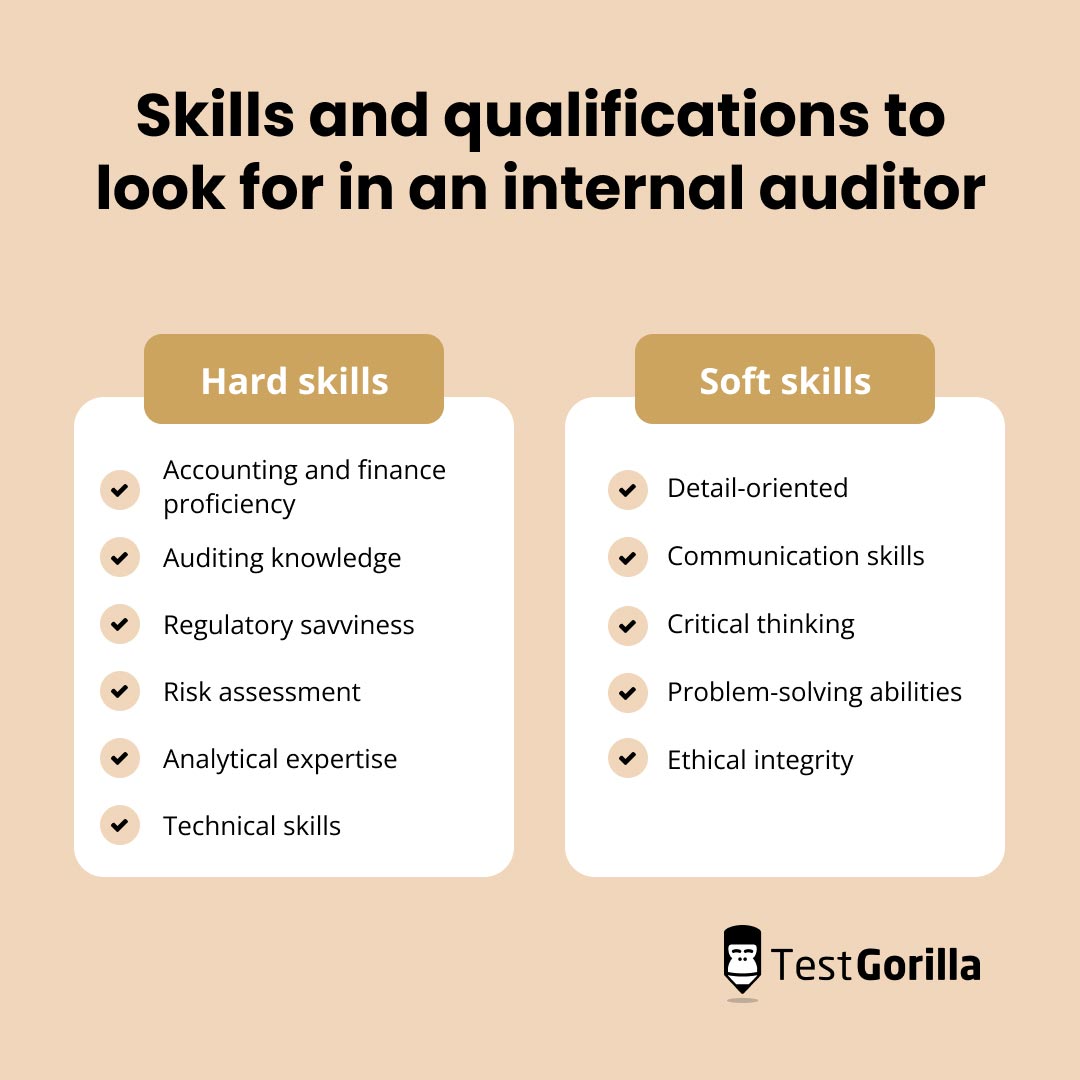Hiring an internal auditor is a strategic move to ensure your company's finances are in good hands. These professionals do more than check the books – they provide the insights you need to make informed business decisions.
A mis-hire can disrupt your financial operations and team dynamics, potentially leading to significant setbacks. However, the right auditor can inspire improvement and growth.
In this guide, we show you how to identify and hire a skilled internal auditor. We discuss why hard and soft skills are both important, how to attract the right candidates, and how to use pre-employment testing to make a well-informed hiring decision.
Table of contents
What you need to know before hiring an internal auditor
An internal auditor assesses the risks and controls in an organization, ensuring accuracy in financial reporting and helping the business comply with laws and regulations.
Before you start the hiring process, you should understand what this position entails and what prepares someone for success in it. Make the following considerations:
The best time to hire an internal auditor
Not all companies require internal auditors, but those with greater complexity and regulatory demands often find them essential for risk management and operational efficiency.
Unsure if it’s the right time to hire an internal auditor? Consider bringing one on when:
Your company is experiencing growth and your financial operations become increasingly complex
You have concerns about compliance with laws and regulations
Your internal controls must be established or strengthened
Your company needs an independent assessment of its risks and financial reporting
Your stakeholders require more transparency and accountability in financial matters
Their role and responsibilities
Internal auditors have various responsibilities, including:
Conducting thorough reviews of financial statements and accounting practices
Identifying risks and recommending mitigating controls
Evaluating the effectiveness of internal control systems
Ensuring compliance with laws, regulations, and contracts
Reporting findings to management and suggesting improvements
You should fully understand the importance and scope of their responsibilities so you can seek out candidates capable of handling those responsibilities.
Compensation considerations
Competitive compensation plays a major role in attracting and retaining skilled internal auditors. A well-structured package reflects the value of the auditor's role in protecting the financial integrity of your organization. When determining what to pay an internal auditor and developing their total compensation package, consider the following to ensure your package is fair and competitive:
Research industry standards: Use resources like Salary.com or the Bureau of Labor Statistics to understand the average salary range for internal auditors in your region and sector. This way, you have a baseline for what candidates might expect.
Factor in candidate qualifications: Adjust your offer based on the candidate's experience, education level, and professional certifications. More-experienced auditors or those with specialized certifications typically command higher salaries.
Include additional benefits: Enhance the package with bonuses, health insurance, retirement plans, and other perks. These benefits are crucial for attracting top talent, especially in fields like auditing where candidates will likely go for better job offers if yours doesn’t suffice.
Consult professional organizations like The Institute of Internal Auditors (IIA) for industry-specific insights on compensation. They can provide data on what makes a competitive package for auditors in different industries and regions.
Industry-specific knowledge
While the core skills of an internal auditor are transferable across industries, certain sectors might require additional expertise. For example, a healthcare organization might value experience in healthcare regulations and compliance, while a financial services firm might prioritize knowledge of industry-specific reporting standards.
Consider searching for an internal auditor who understands your industry so they can better protect your company’s financial integrity.
Skills and qualifications to look for in an internal auditor
Here's a breakdown of the essential skills and qualifications your ideal candidate should possess.
Essential hard skills
Accounting and finance proficiency: A strong foundation in accounting principles and financial management, including understanding of how to read and analyze financial statements and use accounting software
Auditing knowledge: Comprehensive knowledge of auditing standards and the ability to apply these standards in practical scenarios.
Regulatory savviness: An up-to-date understanding of relevant financial regulations and laws (such as the Sarbanes-Oxley Act) that govern corporate finance and financial data reporting
Risk assessment: The ability to identify financial risks and the internal controls needed to mitigate them
Analytical expertise: Proficiency using analytical tools and methodologies to dissect financial data and draw insightful conclusions
Technical skills: Familiarity with the latest industry-specific software and IT systems that support auditing processes
Key soft skills
Detail-oriented: Keen attention to detail to catch inconsistencies and errors in financial data
Communication skills: Excellent verbal and written communication skills for explaining complex audit findings to stakeholders (including those without finance backgrounds)
Critical thinking: The ability to think critically about auditing processes and outcomes
Problem-solving abilities: Proficiency in pinpointing financial irregularities and compliance issues coupled with the ability to devise and implement effective, audit-specific resolutions promptly
Ethical integrity: Strong ethical standards and integrity to handle confidential financial data responsibly
Professional qualifications
Certifications: Credentials like Certified Internal Auditor (CIA), Certified Public Accountant (CPA), or Certified Information Systems Auditor (CISA)
Experience: Previous experience in auditing or a related field
Educational background: A bachelor's degree in finance, accounting, or a related field (a master's degree in a relevant area can be a plus)
Desirable additions
Sector-specific experience: For industries with specialized financial reporting or compliance requirements, prior experience in the same or a related sector could be beneficial.
Continuous learning: A track record of continuous professional development shows a commitment to keeping up with the evolution of auditing.
The best insights on HR and recruitment, delivered to your inbox.
Biweekly updates. No spam. Unsubscribe any time.
Where to find skilled internal auditors
After you've used the above considerations and skills to create an effective internal auditor job description, begin your candidate search. Finding a skilled internal auditor can be challenging, but strategic search methods can yield the best candidates.
Traditional avenues for hiring internal auditors
IIA: As a global organization for internal auditors, the IIA is a top resource. Membership directories and IIA-sponsored job boards are valuable for spotting certified professionals.
Association of Certified Fraud Examiners (ACFE): Looking for auditors with a specialty in fraud prevention? The ACFE’s network can connect you with experts.
Finance and accounting recruiters: Agencies specializing in finance and accounting have a deep understanding of the audit talent market and can help identify candidates with the skills you require.
5 more creative ways to find internal auditor candidates
Below are more creative ways to source your next internal auditor.
1. Webinars and online courses
Webinars and courses offered by authoritative bodies like the IIA or the American Institute of CPAs often provide forums where internal auditors discuss industry-specific challenges. A webinar on the latest changes in tax legislation is a great setting for finding auditors keeping up with those changes, for example. You can use such forums to network with potential candidates.
2. Employee networks
Consider asking your employees to refer qualified candidates. Be specific about the unique demands of the role. For example, if your company recently adopted new financial software like Galvanize (formerly ACL Analytics), an employee might know a peer skilled in this technology.
3. Campus recruitment
Consider recruiting from universities renowned for their accounting programs that offer specialized courses in audit compliance or forensic accounting. These might include the highly ranked University of Southern California (USC)’s Leventhal School of Accounting.
Engaging with faculty members who teach these courses can provide direct access to top graduates. Partnering with a university for a guest lecture series or a case study competition is another great way to spot emerging talent.
4. Niche online communities
Seek out online communities specifically tailored to internal auditing – like forums on the IIA website. There, you can network with potential candidates.
5. Grow your own talent
Search your finance department for employees who show aptitude for detailed analysis and regulatory compliance. For example, an employee who’s successfully led a project to streamline the company’s expense reporting process might excel in an internal audit role.
Offer them targeted training – like a certification course in internal auditing – to prepare them for this new role. To ensure their readiness for the role, you can also test their auditing abilities with skill assessments using pre-employment testing platforms like TestGorilla.
How to select the best internal auditor candidates
Choosing the ideal internal auditor requires a careful selection process. Here’s how to evaluate candidates’ expertise and fit.
Pre-employment testing
Start with objective assessments. TestGorilla, for example, offers specialized tests to measure a candidate's auditing, data interpretation, and communication skills. You can use our…
Internal Auditing test to evaluate foundational skills, including risk assessment and audit planning
Attention to Detail test to get an idea of how well they can detect data inconsistencies and sift through large amounts of information
International Standards on Auditing test to assess their knowledge of global regulations (for when they collaborate with external auditors)
Business Ethics & Compliance test to test candidates’ ethical values and adherence to company policies
Communication Skills test to learn about candidates’ communication styles and see how well they'll handle tough conversations and explain complex financial details
Culture Add assessment to gauge whether they share your organization’s values and can contribute positively to team dynamics
Interview them
Assess your strongest candidates with structured interviews to explore their expertise in audit principles, risk assessment, and regulatory compliance more deeply. Their responses can provide insight into their practical experience and problem-solving capabilities. Include other team members in the interview to get multiple perspectives on the candidate’s fit. This interaction will contribute to the candidate’s decision, too.
Common mistakes when hiring an internal auditor
Avoid these common errors to hire internal auditors who help your business thrive:
Disregarding data analytics skills
Today's auditors must sift through large data sets. Candidates without strong data analytics skills may miss critical information. If you hire internal auditors without these skills, they can cost your organization revenue.
Further reading: How to use a data analyst skills test to hire top professionals
Forgetting about regulatory knowledge
An auditor should know the latest laws and regulations affecting your industry. Not checking for this knowledge can lead to compliance issues – which can result in hefty fines or harsher legal penalties.
Overlooking soft skills and team dynamics
Interpersonal skills, negotiation, and diplomacy are key for auditors – who often must deliver tough messages and handle multiple professional relationships. The best auditor on paper might not mesh well with your current team.
Considering team dynamics is necessary for a harmonious work environment and lessens the chances of interpersonal contention in your team.
Not testing for ethical judgment
Auditors face ethical decisions regularly. Without assessing a candidate's ethical compass, you risk your company's reputation.
TestGorilla can streamline your hiring process
Selecting an internal auditor is a critical task that calls for a strategic approach. The ideal candidate will have the necessary technical knowledge and share your company’s values.
For an effective search, expand your recruitment efforts to include industry networks and consider internal promotions. Employee referrals can also lead to promising candidates.
To fine-tune your hiring process, use testing. TestGorilla’s tests cover various aspects of accounting and ethical judgment. These tests, alongside structured interviews, enable you to assess your candidates’ skills fairly and find the best candidate.
Wish to learn more? Take a product tour or sign up for our free plan. Start hiring standout internal auditors with our help today.
You've scrolled this far
Why not try TestGorilla for free, and see what happens when you put skills first.















